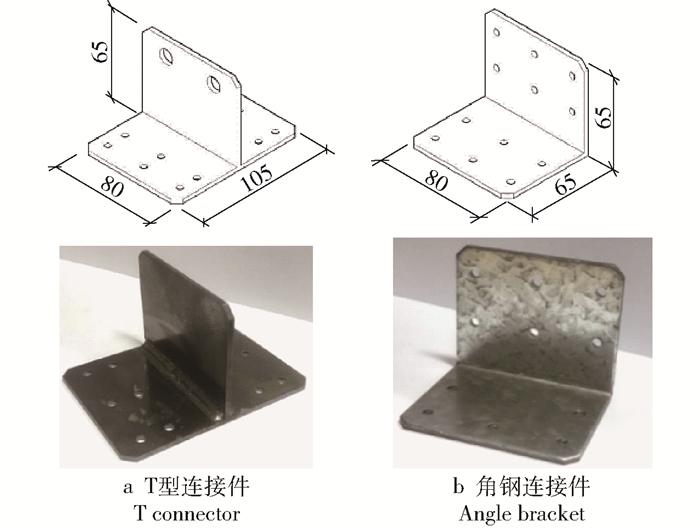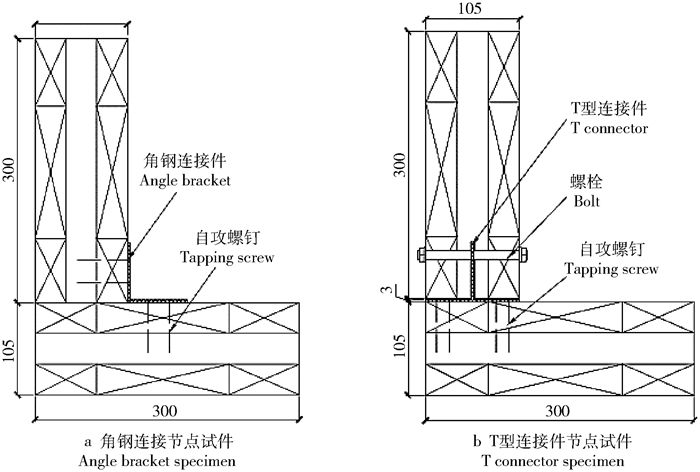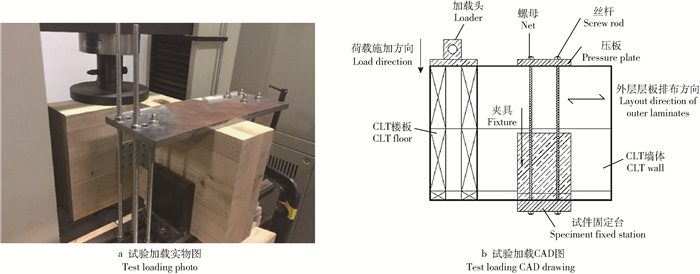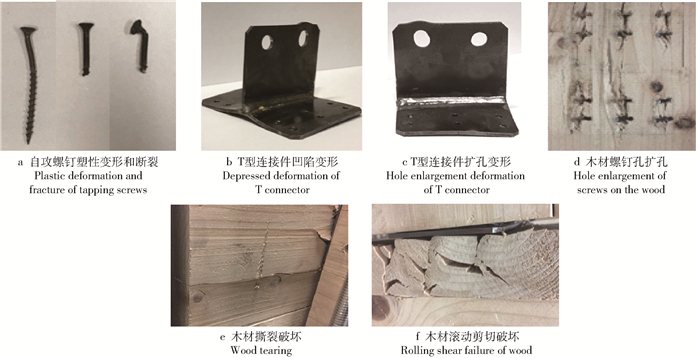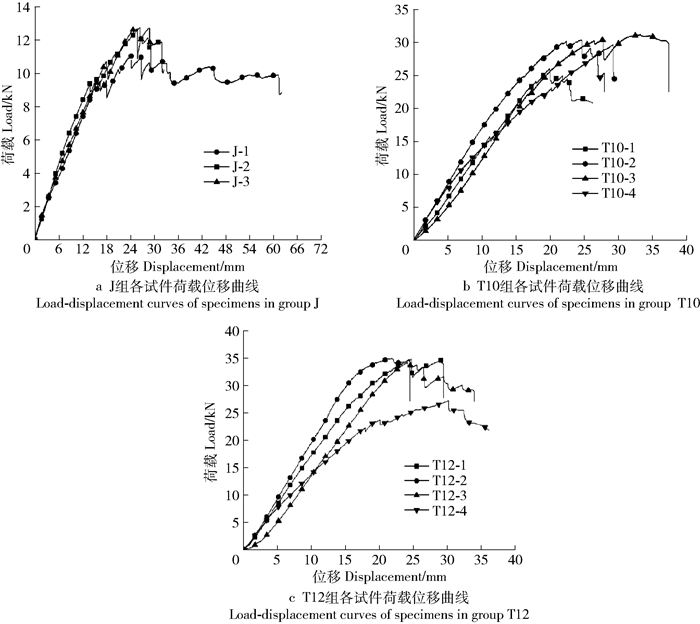Mechanical performance of CLT wall-to-floor joints with T connector
-
摘要:目的正交胶合木(CLT)较之传统的结构用工程木质材料,因其优异的材料性能使得现代木结构建筑能够向高层建筑发展。然而,现有的结构连接节点并不能完全体现CLT板材本身所具有的优异性能。对T型连接件在CLT墙体-楼板处的节点应用进行抗剪性能研究,并与角钢的连接性能进行比较,以探究T型连接件节点的可行性,为T型连接件在CLT建筑中的应用提供科学依据。方法分别对角钢连接节点试件、不同螺栓直径的T型连接件节点试件进行了单调加载试验。通过特征值分析法,对试验所得的荷载-位移曲线进行分析,对比不同连接节点形式下的峰值荷载、初始刚度、延性系数和耗能情况。结果相比传统的角钢连接节点,T型连接件节点的金属件破坏程度低,木材破坏程度高,且其峰值荷载提高了142.5%,初始刚度提高了125.0%,延性系数下降了33.2%,耗能提高了132.6%。当T型连接件节点的螺栓直径从10 mm增大到12 mm时,其峰值荷载提高了13.2%,初始刚度提高了13.7%,延性系数提高了16.2%,耗能提高了14.8%。结论T型连接件能更好地抵抗墙体-楼板节点的剪切力,并能更好地体现CLT自身的刚度,且T型连接件用于CLT建筑中墙板-楼板节点的力学性能总体好于角钢。对于T型连接件节点,适当增大螺栓的直径可提高其连接强度,但提高程度有限。Abstract:ObjectiveCLT (cross-laminated timber), compared with the traditional structural engineered wood products, is featured for its good quality which makes it possible for modern wooden buildings to break through the height limitation. However, the strength of the joint part cannot effectively utilized the capacity of CLT strength. In order to provide a scientific basis for the application of T connector in CLT building, this paper made a study of the shear performance of the T connector, and then compared it with the angle bracket used for the wall-to-floor joints.MethodBoth the T connector specimens and the angle bracket were tested under the monotonic loading. Based on the characteristic analysis method, peak load, initial stiffness, ductility coefficient and energy dissipation were calculated and analyzed.ResultCompared with the traditional angle bracket, T connector showed a lower damage degree of metal and a higher damage degree of wood part. The peak load, initial stiffness and energy dissipation of T connector increased by 142.5%, 125.0% and 132.6%, respectively, while the ductility coefficient decreased by 33.2%. When the diameter of the bolts increased from 10 to 12 mm, the peak load, initial stiffness, ductility coefficient and energy dissipation of T connector increased by 13.2%, 13.7%, 16.2% and 14.8%, respectively.ConclusionThe test results indicate that T connector can resist higher shear strength in the wall-to-floor joints. The mechanical propoerty of T connector is superior to angle bracket. With the increment of the diameter of bolts, it would appropriately lead to a higher mechanical performance.
-
Keywords:
- CLT /
- wall-to-floor joint /
- T connector /
- angle bracket /
- mechanical property
-
从古至今,木材作为一种天然可再生的环保型材料,以其独特的性能和优良的环境学特性深受人们喜爱,并广泛应用于生产生活的各个方面。随着现代科学技术的突飞猛进、人类学理论的不断发展,考古木材作为进行植物考古学和环境考古学研究的一种典型生物材料,正成为专家学者的研究热点,国内外考古作业挖掘出大量的木质文物[1-2],例如:“Riksapplet号”沉船[3]、“小白礁Ⅰ号”沉船[4]、“南海Ⅰ号”船木[5]等为出土考古木材的研究提供了丰富的材料。
Crestini等[6]运用X射线衍射和扫描电镜的方法对埃及古代棺木进行研究,研究发现:考古木材中纤维素、半纤维素、木质素均产生不同程度的降解,小分子化合物发生改变,使考古木材变得脆弱而柔软。Łucejko等[7]运用热裂解气相色谱–质谱联用法对取自比萨圣罗索雷古船的木材样品进行了主成分分析,样品木质素中愈创木基和紫丁香基的去甲基化表明考古木材中多糖产生了流失。卢芸[8]指出大多木质文物纤维素结晶区被严重破坏,葡聚糖侧链的乙酰基消失,多糖类物质遭到严重降解,木质素相对含量明显增加。
考古木材微观结构的变化,将在很大程度上影响其水分吸着行为,因而可利用等温吸附曲线和水分吸着理论对考古木材与吸着水分子的相互作用进行分析,如Guggenheim-Anderson-de Boer模型[9]、Hailwood-Horrobin模型[10]等。Guo等[11]利用Guggenheim-Anderson-de Boer模型计算得到每千克古代润楠木(Machilus pingii Cheng ex Yang)样品的最大单层吸水量为7.388 kg,而相同树种现代木材的最大单层吸水量仅为4.602 kg,考古木材的最大单层吸水量比现代木材增加了61%。
木材的水分吸着过程必然伴随着热量或能量的变化[12],因此基于吸附热力学考察水分吸着机理,有助于从本质上获得考古木材与水分相互作用方面的信息。曹金珍[13]发现西藏云杉(Picea spinulosa)在水分吸着过程中微分吸着热、微分吸着熵值随吸湿过程不断增大。Simón 等[14]研究了在吸湿和解吸平衡态下辐射松(Pinus radiata)的微分吸着熵值随含水率的变化曲线,结果显示在相同平衡含水率下辐射松解吸的微分吸着熵值大于吸湿值。
在以往的研究中,研究者多从成分、结构角度对考古木材水分吸着行为进行研究,且取得了一定进展,而对考古木材的吸附热力学研究较少,而且对各种热力学量变化的系统分析也很欠缺。本研究将聚焦考古木材在吸湿和解吸平衡状态下微分吸着热、自由能变化及微分吸着熵三大热力学量的研究,并分别利用电子显微镜(scanning electron microscope,SEM)、傅里叶红外光谱(Fourier transform infrared spectroscopy,FTIR)分析考古木材的细胞壁结构和化学成分变化,从而建立考古木材微观结构与其水分吸着行为间的构效关系,探究考古木材与现代木材在水分吸附热力学方面的差异及其原因,为从能量角度解析考古木材与水分之间的相互作用机制奠定理论基础,同时也可为我国木质文物的保护提供科学依据,以减少出土饱水木质文物与环境中水分的相互作用,提高木质文物的尺寸稳定性。
1. 材料与方法
1.1 材 料
本研究所用考古木材取自成都文物考古研究院发掘出土的南宋木棺残片,由研究院提供的材料和信息确定为考古柏木,并采集四川产柏木(Cupressus sp.)作为现代对照材。
1.2 细胞壁微观形貌表征
利用滑动切片机(REM-710,Yamato Kohki industrial Co.,Ltd,Japan)制得尺寸为1 mm(轴向) × 2 mm(弦向) × 2 mm(径向)的柏木考古木材与现代木材薄片试样(试样重复数为3),用于SEM观察。在80 ℃的鼓风干燥箱中将试样干燥至质量恒定后进行喷金处理,设置SEM(S-3400,Hitachi,日本)加速电压为3 kV,对柏木试样的细胞结构进行观察,初步了解考古木材的降解、腐朽情况。
1.3 化学成分表征
利用研磨机将考古木材与现代木材样品加工成100目以下的木粉,并在80 ℃的真空干燥箱中干燥至质量恒定,之后将木粉与溴化钾充分混合研磨压制成透明薄片,利用红外光谱仪(BRUKER vertex 70 V,德国)对试样进行检测分析,扫描范围设为400 ~ 4 000 cm−1,分辨率为4 cm−1,每个试样扫描次数为32次。重复测试3次,取平均值。
1.4 吸附热力学量测定
将柏木考古木材、现代木材样品加工为20 mg左右木片,并分别置于(103 ± 2)℃下干燥至质量恒定,用于动态水分吸附分析(dynamic vapor sorption,DVS)实验。将各组试样放入DVS中,分别预设恒定温度为25和50 ℃,相对湿度以10%为梯度从0%增加到90%,继续增加至95%,然后降回至90%,再以10%为梯度从90%降低到0%,试样在每个相对湿度下逐渐达到吸湿/解吸平衡后(当样品质量变化速率连续在10 min内小于0.000 1%/min,则认为样品达到吸湿/解吸平衡),仪器自动进入下一个相对湿度梯度。仪器每隔1 min记录样品质量、温度和相对湿度等数据,得到考古木材和现代木材的吸湿和解吸平衡的等温吸附曲线。
利用Hailwood-Horrobin水分吸着理论[10]分析所获得的等温吸附曲线,木材在不同相对湿度条件下达到的平衡含水率可表达为
M=Mh+Md=18m(KhKdH1+KhKdH+KdH1−KdH) (1) 式中:M为试样平衡含水率(%);Mh为水合水质量分数(%);Md为溶解水质量分数(%);m为单位摩尔数吸着位点的绝干木材质量(g/mol);Kh为水合水与溶解水之间的平衡常数;Kd为溶解水与环境温湿度之间的平衡常数;H为相对湿度(%)。
将式(1)整理成多项式,具体为
HM=A+BH−CH2 (2) 式中:A、B、C为多项式的拟合参数,A、B、C与Kh、Kd、m的关系为
A=m18×1Kd(Kh+1) (3) B=m18×Kh−1Kh+1 (4) C=m18×KhKdKh+1 (5) 通过不同相对湿度环境试样的等温吸湿曲线数据分析可得到拟合参数A、B、C的值,进而可以求解m、Kh和Kd的值,公式中
m18 的倒数18m 表示木材中有效吸着基团被水合水饱和时的含水率,间接表达了水分吸着位点的数量。利用各组试样的DVS数据拟合等温吸附曲线,进一步通过Clausius-Clapeyron公式[15]分别计算考古木材与现代木材的微分吸着热QS、自由能变化ΔG和微分吸着熵ΔS,分析考古木材与现代木材在吸附热力学量间的差异,各热力学量的计算公式如下。
QS=0.254d(ln1H)/d(ln1H)d(1T)d(1T) (6) ΔG=−RT18lnH (7) ΔS=QS−ΔG/T (8) 式中:T为温度(K);R为气体常数。
T和H的值均由DVS实验的拟合数据获取,然后分别通过公式(6)、(7)计算得到QS和ΔG的值,进一步计算得到ΔS。
2. 结果与讨论
2.1 细胞壁结构
图1为考古木材与现代木材横切面、纵切面的SEM图片。对比考古木材与现代木材图像,可以发现在经历长时间的饱水腐朽下,考古木材除复合胞间层、细胞角隅保存相对完整外[16-17],其细胞壁结构发生了明显的变化,与现代木材完整有序的细胞排列相比(图1b),考古木材由于长时间遭受微生物降解,细胞结构发生破坏,细胞壁产生腐朽。
具体而言,考古木材细胞壁上出现少量圆形孔洞(图1a),除此之外,从考古木材纵切面可见纹孔膜腐朽细节(图1c),并有菌丝体的存在(图1d),该菌丝体是导致考古木材在所处环境中受到降解的各类真菌的聚集体。Guo等[11]通过氮气吸附法和压汞法对山桐子(Idesia polycarpa)考古木材多孔结构的研究结果表明,考古木材的中孔隙的总孔体积比现代木材样品增加了471%,这也进一步证明了本研究中考古木材孔洞增多的事实。
2.2 化学成分变化
对等量考古木材与现代木材样品的红外光谱进行归一化处理后,可用吸收峰高度半定量表示吸收峰所代表基团的含量[18],通过对比考古木材与现代木材试样红外光谱(图2)的特征吸收峰位置变化及消失情况,结合各特征吸收峰所代表的化学基团,研究得到考古木材3种主要化学成分(纤维素、半纤维素、木质素)的含量变化情况及极性基团−OH、−COOH类型和含量的变化情况。
3 337 ~ 3 401 cm−1范围内的吸收峰代表极性基团−OH(O−H伸缩振动),考古木材在此处的吸收峰高度小于现代木材,证明考古木材中−OH含量减少。选取1 742 cm−1(半纤维素C=O伸缩振动)、1 231 cm−1(半纤维素酰氧键−COO伸缩振动)为半纤维素的代表特征峰,与现代木材相比,柏木考古木材的红外吸收光谱在1 742、1 231 cm−1处吸光度变小,特别是在1 742 cm−1处吸收峰几乎完全消失,证明考古木材细胞壁结构中的半纤维素降解严重;另一方面,1 231 cm−1吸收峰代表半纤维素酰氧键−COO,考古木材在1 231 cm−1处的吸收峰高度明显小于现代木材,证明考古木材半纤维素上的−COOH含量减少。
此外,由于考古木材纤维素结晶区中纤维素链的氢键网络的部分断裂,导致892 cm−1处的峰几乎消失,而该处波峰代表C−H弯曲振动,并且对氢键系统的性质敏感,因此该峰几乎消失表明,在考古木材试样中形成更稳定氢键的羟基数量减少,同时这也表明考古木材中无论是无定形区还是结晶区中的纤维素链都发生部分降解[19]。
指纹区吸收光谱峰数多、较为复杂,包含了更多能反映分子结构细微变化的信息[20]。为了提供更多的信息,将FTIR光谱图分析细化至3个指纹区域(1 550 ~ 1 800 cm−1、1 200 ~ 1 550 cm−1和850 ~ 1 200 cm−1),在这个范围内通过直接的红外光谱分析考古木材和现代木材仍存在一定局限性,因为指纹区往往存在高度重叠的峰,难以分辨和解析。为此,通过对考古木材和现代木材指纹区光谱进行分峰拟合处理,得到分峰拟合曲线,可以更直观地分析考古木材化学成分的变化。
通过对比考古木材和现代木材FTIR在1 550 ~ 1 800 cm−1波数范围内的分峰拟合曲线(图3a)可以发现,考古木材在1 654 cm−1(木质素中共轭C=O伸缩振动)处吸收峰吸光度值较高,这说明考古木材木质素相对含量升高。通过对比考古木材和现代木材FTIR在1 200 ~ 1 550 cm−1波数范围内的分峰拟合曲线(图3b)可以发现,考古木材在1 418 cm−1(木质素甲基中C−H弯曲振动)处吸收峰强度变大,代表考古木材木质素相对含量升高。通过对比分析考古木材和现代木材FTIR在850 ~ 1 200 cm–1波数范围内的分峰拟合曲线(图3c)可以得到:考古木材在892 cm–1(纤维素C−H弯曲振动)处峰几乎消失,这表明在考古木材中形成更稳定氢键的羟基数目减少;1 159 cm–1(综纤维素C−O−C变形振动)处,考古木材吸收峰吸光度值很低,这表明综纤维素也有一定程度的降解。
综上可以发现,考古木材与现代木材相比,半纤维素、纤维素降解严重,纤维素骨架结构受到破坏,因此在SEM下可观察到细胞壁产生腐朽,这种化学成分和化学结构的变化进一步导致了细胞壁孔洞的出现,从化学成分变化角度解释了SEM中观察到考古木材出现孔洞等腐朽现象的原因。通过Xia等[21]的研究,考古木材木质素的化学结构也发生了变化,木质素仍会有降解,但考古木材中多糖类物质(纤维素、半纤维素)比芳环类物质(木质素)降解程度更高,因而木质素相对含量总体有升高趋势[22-23]。除纤维素、半纤维素含量降低及木质素相对含量升高的变化外,考古木材中极性基团−OH、−COOH含量均减少,导致考古木材对水分的吸着减少。
2.3 吸附热力学分析
2.3.1 Hailwood-Horrobin模型拟合
通过Hailwood-Horrobin模型拟合等温吸附曲线,不仅可以得到给定温度下木材吸湿和解吸任意平衡含水率状态下的相对湿度,更可以通过研究考古木材与现代木材的曲线差异,帮助理解考古木材水分吸附行为的差异本质。
根据Hailwood-Horrobin模型分别拟合出在25和50 ℃下考古木材、现代木材的等温吸附曲线(图4)。从中可以看出各等温吸附曲线的拟合度R2值均高于0.99,即Hailwood-Horrobin模型能够较好地描述考古木材及现代木材的等温吸附曲线。所有的等温吸附曲线均呈现“S”形,这说明无论考古木材还是现代木材都属于Ⅱ类等温吸附曲线,具备多孔材料的吸附特征[24-25]。在给定温度的每一个相对湿度条件下,考古木材的平衡含水率均高于现代木材,以温度为50 ℃,相对湿度为0.6时为例,考古木材平衡含水率为7.94%,现代木材为7.46%,考古木材是现代木材的1.1倍。这是因为图1a的 SEM图像显示考古木材物理环境遭到改变,细胞壁孔洞增多,即木材降解程度越大,木材细胞壁内孔隙越多,对水分的容纳空间增加,含水率越高,所以考古木材在经历长时间的降解后平衡含水率高于现代木材。
图5为50 ℃下考古木材吸湿和解吸平衡状态的等温吸附曲线,图5显示考古木材的解吸曲线始终位于吸湿之上,即出现了水分吸湿滞后现象。表1总结了在不同相对湿度条件下,考古木材、现代木材分别在25、50 ℃下的滞后率。从表1可以看出:随着温度或相对湿度的升高,考古木材和现代木材的滞后率均增大,即水分吸湿滞后均减小,这与以往研究结果一致[13];另一方面,考古木材与现代木材的水分吸湿滞后大小差异不大。
2.3.2 吸湿平衡状态下的热力学量分析
2.3.2.1 微分吸着热
图6是吸湿平衡状态下考古木材与现代木材中水分的微分吸着热(QS)随含水率(moisture content,MC)的变化曲线,QS值越大表示木材中水分子与周围分子之间的结合力越强[13]。与以往研究结果略有不同的是,在MC为5%处产生一明显拐点。根据曲线变化趋势,可以将曲线分为两个阶段,当MC小于 5%的低含水率状态下时,QS值逐渐增大直至达到最大值,这表明水分子和木材之间的氢键结合首先表现为单层分子之间的相互结合,且随MC增大,单个水分子和木材中的−OH形成了更多的氢键结合,相互作用更强,形成的键能更高[18]。当含水率大于5%时,QS值随MC的增大而减小,此时单分子层吸着水几乎达到饱和,吸着水分子与木材实质之间形成的氢键结合作用变弱,键能降低[13]。
表 1 考古木材、现代木材在25、50 ℃下不同相对湿度下的吸湿滞后Table 1. Moisture sorption hysteresis of archaeological wood and recent wood under different relative humidities at 25 and 50 ℃相对湿度
Relative humidity滞后率 Hysteresis rate 25 ℃考古木材
25 ℃-archaeological wood50 ℃考古木材
50 ℃-archaeological wood25 ℃现代木材
25 ℃-recent wood50 ℃现代木材
50 ℃-recent wood0.1 0.62 0.74 0.63 0.71 0.2 0.63 0.72 0.64 0.73 0.3 0.64 0.72 0.65 0.74 0.4 0.66 0.73 0.67 0.76 0.5 0.68 0.75 0.70 0.78 0.6 0.71 0.77 0.73 0.81 0.7 0.76 0.81 0.77 0.84 0.8 0.82 0.86 0.84 0.89 0.9 0.91 0.94 0.93 0.95 考古木材与现代木材相比,整体曲线形状基本相同,但考古木材的QS值随MC的变化曲线位于现代木材之下。根据上文FTIR分析,考古木材化学成分中纤维素、半纤维素大量降解,因此外界水分子可结合−OH、−COOH位点数量减少,这种化学环境的改变导致吸着水与木材分子之间的结合减少,QS值降低[26]。
2.3.2.2 自由能变化
水分的自由能变化的物理意义是水分子润胀木材并切断木材分子相互间氢键结合,裸露木材吸着点所需做的功[13]。基于图7所示吸湿平衡状态下考古木材与现代木材中水分的自由能变化ΔG值随MC的变化曲线,可以发现考古木材与现代木材的ΔG值均随MC的增大而减小。ΔG值与MC变化呈负相关可以解释为,MC升高使木材可塑性增大,吸着水分子与木材实质分子的协同运动加剧,因此裸露木材吸着点所需做的功减少。
其次,无论是考古木材或是现代木材,50 ℃相较于25 ℃的ΔG值都有一定程度的减小,这是因为温度升高吸着水分子能量增加,活动加剧,所需做的功减小。
2.3.2.3 微分吸着熵
微分吸着熵(ΔS)体现了木材中吸着的水分子与液态水分子相比排列规则上的差异,ΔS > 0代表木材中水分子排列更有规律[13]。根据吸湿平衡状态下考古木材与现代木材中水分的ΔS值随MC的变化曲线(图8)可知:ΔS值与QS值随MC的变化曲线在MC小于5%呈现相似的变化趋势,都随MC的增大而增大。在MC小于5%的低含水率阶段,ΔS < 0表明木材中吸着的水分子比液态水分子更无序,这是因为此时木材中吸着的水分子主要为单分子层吸着水,它们比处于液体状态的水分子显示出更无序的状态;在经过5%的拐点之后,ΔS值随MC变化不明显。而随着MC的增大,ΔS值经历了由负到正、由无序到有序的变化,这说明吸着在木材中的水分子排列越来越规则。
进一步分析考古木材与现代木材的曲线差异,考古木材ΔS值低于现代木材,这是因为考古木材在经历长期酸碱环境下软腐菌等真菌的降解后[27],细胞壁出现的孔洞分布是随机的,且与水结合的−OH分布也十分不均匀,造成考古木材中吸着的水分子排列更无序。
2.3.3 水分吸湿与解吸的比较
以50 ℃考古木材为例,分别绘制QS、ΔG、ΔS三大热力学量随MC的变化曲线,每张图包含吸湿和解吸平衡态下的两条曲线(图9)。发现吸湿和解吸变化曲线形状基本一致,但解吸的QS、ΔG和ΔS值均大于吸湿的值[14],对应于水分吸湿滞后(图5),这个现象即为“热力学吸湿滞后”,其表征在吸湿与解吸平衡态下,每一个吸着水分子与木材吸着点之间的氢键结合平均数的差异[13]。
热力学吸湿滞后同样可以用水分吸湿滞后的“有效羟基说”[28]解释,即在干燥状态下,部分木材吸着点之间形成氢键结合,当木材从干燥状态开始吸湿时,由于这部分已经形成的氢键结合的影响,处于游离状态能够吸着水分子的吸着点的数量减少,每个吸着水分子与木材吸着点之间的氢键结合平均数减少,从而吸湿的热力学量也低于解吸过程。
3. 结 论
为探究考古木材的水分吸着行为与现代木材的差异机理,本研究从考古木材与现代木材微观结构与吸附热力学两个层面进行了研究。
考古木材三大主要成分(纤维素、半纤维素、木质素)均发生不同程度的降解,且考古木材中极性基团−OH、−COOH含量均减少,导致考古木材对水分的吸着减少。其中半纤维素、纤维素降解程度更大,因此在SEM中可观察到细胞壁产生腐朽,且可见孔洞分布;而考古木材中多糖类物质(纤维素、半纤维素)比芳环类物质(木质素)降解程度更高,因而木质素相对含量升高。
在吸附热力学研究中,通过DVS等温吸附实验并利用Hailwood-Horrobin模型拟合等温吸附曲线,在给定温度条件下考古木材的平衡含水率高于现代木材。结合Clausius-Clapeyron公式计算考古木材与现代木材的QS、ΔG和ΔS三大热力学量。考古木材因纤维素、半纤维素降解导致−OH、−COOH数量减小,QS值低于现代木材;考古木材与现代木材的ΔG值差异不大,且随温度升高而减小;考古木材的细胞壁孔洞、−OH分布不均匀,所以ΔS值低于现代木材;在MC小于5%,考古木材QS值和ΔS值随MC的变化曲线趋势相似,在此范围内木材中吸着的水分子主要为单分子层吸着水,随后在5%处产生一拐点,此时单分子层吸着水达到饱和,此后木材中吸着的水分子以多分子层吸着水占主导。最后,通过对比吸湿和解吸过程的热力学量(吸湿 < 解吸),发现考古木材存在热力学吸湿滞后现象。
基于以上对于考古木材水分吸着行为差异的研究,考古木材的吸湿性在经历长时间的泡水、腐朽下发生了较大变化,因此在出土饱水木质文物的保护工作中,建议采用各种物理、化学手段减少木质文物与环境中水分的相互作用,如涂覆防水涂层、浸渍脱水材料等,从而提高木质文物的尺寸稳定性[29],为我国出土饱水木质文物的保护提供理论支撑。
-
表 1 各组试件参数
Table 1 Specimen parameters of each group
组别编号
Group No.试件个数
Specimen number自攻螺钉
Tapping screw螺栓
Bolt直径
Diameter/mm长度
Length/mm强度等级
Strength grade直径
Diameter/mm长度
Length/mm强度等级
Strength gradeJ 3 4 60 8.8 T10 4 4 60 8.8 10 130 8.8 T12 4 4 60 8.8 12 130 8.8 注:J代表角钢,T10代表螺栓直径为10 mm的T型连接件,T12代表螺栓直径为12 mm的T型连接件。Notes: J represents the angle bracket, T10 represents T connector with bolt diameters of 10 mm, and T12 represents T connector with bolt diameters of 12 mm. 表 2 各试件的力学性能参数
Table 2 Mechanic parameters of specimens
试件编号
Specimen No.峰值荷载
Peak load/kN初始刚度
Initial stiffness/(kN·mm-1)延性系数
Ductility coefficient耗能
Energy dissipation/(kN·mm)J-1 11.06 0.47 5.94 536.73 J-2 12.73 0.70 2.86 276.64 J-3 12.70 0.62 1.54 236.05 T10-1 26.04 1.37 1.56 409.21 T10-2 30.38 1.69 1.50 595.18 T10-3 31.20 1.10 1.22 749.27 T10-4 28.14 1.39 1.15 467.33 T12-1 34.81 1.71 1.55 645.94 T12-2 34.89 1.84 1.23 533.80 T12-3 34.13 1.47 1.62 707.23 T12-4 27.19 1.30 1.90 662.16 注:试件J-1的试验结果偏差过大,因此对J组的各力学性能参数取平均值时将其剔除。Notes: the deviation of test results for specimen J-1 is oversized, so it is eliminated when calculating the mean value of each mechanical performance parameters for group J. 表 3 峰值荷载平均值
Table 3 Mean value of maximum load
组别Group J T10 T12 峰值荷载Peak load/kN 12.72 28.94 32.76 标准差Standard deviation 0.02 2.01 3.23 表 4 初始刚度平均值
Table 4 Average initial stiffness
组别Group J T10 T12 初始刚度
Initial stiffness/(kN·mm-1)0.66 1.39 1.58 标准差
Standard deviation0.04 0.21 0.21 表 5 延性系数平均值
Table 5 Average ductility coefficient
组别Group J T10 T12 延性系数Ductility coefficient 2.20 1.36 1.58 标准差Standard deviation 0.66 0.18 0.24 表 6 耗能平均值
Table 6 Average energy dissipation
组别Group J T10 T12 耗能
Energy dissipation/(kN·mm)256.35 555.25 637.28 标准差
Standard deviation20.30 130.67 63.83 -
[1] 王韵璐, 曹瑜, 王正, 等.国内外新一代重型CLT木结构建筑技术研究进展[J].西北林学院学报, 2017, 32(2): 286-293. doi: 10.3969/j.issn.1001-7461.2017.02.50 Wang Y L, Cao Y, Wang Z, et al. Research progress of the new generation of heavy CLT wood structure building technology[J]. Journal of Northwest Forestry University, 2017, 32(2): 286-293. doi: 10.3969/j.issn.1001-7461.2017.02.50
[2] 张志伟. CLT板工作性能与应用研究[D].西安: 长安大学, 2015. http://cdmd.cnki.com.cn/Article/CDMD-10710-1015803139.htm Zhang Z W. Research on performance and the application of CLT plate[D]. Xi'an: Chang'an University, 2015. http://cdmd.cnki.com.cn/Article/CDMD-10710-1015803139.htm
[3] 姚悦, 张敬婷, 周甲林, 等.正交胶合木建筑连接形式及新型自攻螺钉的发展[J].林业机械与木工设备, 2017, 45(9): 4-9. doi: 10.3969/j.issn.2095-2953.2017.09.001 Yao Y, Zhang J T, Zhou J L, et al. Connection forms of cross-laminated timber architecture and development of self-tapping screws[J]. Forestry Machinery & Woodworking Equipment, 2017, 45(9): 4-9. doi: 10.3969/j.issn.2095-2953.2017.09.001
[4] 熊海贝, 欧阳禄, 吴颖.国外高层木结构研究综述[J].同济大学学报(自然科学版), 2016, 44(9): 1297-1306. http://d.old.wanfangdata.com.cn/Periodical/tjdxxb201609001 Xiong H B, Ouyang L, Wu Y. State-of-the-art research of tall wood buildings[J]. Journal of Tongji University (Natural Science), 2016, 44(9): 1297-1306. http://d.old.wanfangdata.com.cn/Periodical/tjdxxb201609001
[5] Uibel T, Blaß H J. Edge Joints with dowel type fasteners in cross laminated timber[J]. Proceedings CIB, 2007. http://cn.bing.com/academic/profile?id=38c8392de7bd05b588f6e8873b15f7d0&encoded=0&v=paper_preview&mkt=zh-cn
[6] Hossain A, Danzig I, Tannert T. Cross-laminated timber shear connections with double-angled self-tapping screw assemblies[J]. Journal of Structural Engineering, 2016, 142(11): 04016099. doi: 10.1061/(ASCE)ST.1943-541X.0001572
[7] Izzi M, Flatscher G, Fragiacomo M, et al. Experimental investigations and design provisions of steel-to-timber joints with annular-ringed shank nails for cross-laminated timber structures[J]. Construction and Building Materials, 2016, 122: 446-457. doi: 10.1016/j.conbuildmat.2016.06.072
[8] Tomasi R, Smith I. Experimental characterization of monotonic and cyclic loading responses of CLT panel-to-foundation angle bracket connections[J]. Journal of Materials in Civil Engineering, 2014, 27(6): 04014189. http://www.wanfangdata.com.cn/details/detail.do?_type=perio&id=bec1d28be62be38c35d89572a4a3ab67
[9] Gavric I, Fragiacomo M, Ceccotti A. Cyclic behaviour of typical metal connectors for cross-laminated (CLT) structures[J]. Materials and Structures, 2015, 48(6): 1841-1857. doi: 10.1617/s11527-014-0278-7
[10] Pozza L, Saetta A, Savoia M, et al. Coupled axial-shear numerical model for CLT connections[J]. Construction and Building Materials, 2017, 150: 568-582. doi: 10.1016/j.conbuildmat.2017.05.141
[11] European Committee for Standardization. Timber structures-joints made with mechanical fasteners-general principles for the determination of strength and deformation characteristics: EN 26891-1991[S]. Brussels, Belgium, 1991.
[12] Japan 2x4 Home Builders Association. Structural design guidelines for wood frame construction[R]. Tokyo: Japan 2x4 Home Builders Association, 2002: 233-241.
-
期刊类型引用(6)
1. 冯林艳,周火艳,赵晓迪. 乌兰布和沙漠两种植物的分布格局及其变化. 南京林业大学学报(自然科学版). 2024(01): 155-160 .  百度学术
百度学术
2. 曾红,徐永艳,邵琳亚,闻永慧,夏小丽,汪琼. 4种植物叶片浸提液成分分析及其对珊瑚樱种子萌发的影响. 西南林业大学学报(自然科学). 2023(04): 39-46 .  百度学术
百度学术
3. 马光宗,徐高峰,杨韶松,杨云海,张付斗,温丽娜,陶琼,申时才,叶敏. 甘薯提取物对3种杂草种子萌发和幼苗生长的化感作用. 西南农业学报. 2022(06): 1295-1302 .  百度学术
百度学术
4. 路文杰,佛芒芒,肖毅,王永新,杜利霞,钟华,赵祥,董宽虎. 草地植物凋落物浸提液对根际微生物碳源利用的影响. 中国草地学报. 2021(06): 35-42 .  百度学术
百度学术
5. 张林媚,刘姝玲,郭彩云. 立地条件对榆林沙区樟子松嫁接红松生长的影响. 林业科技通讯. 2021(11): 32-37 .  百度学术
百度学术
6. 王方琳,尉秋实,柴成武,王理德,张德魁,王昱淇,王飞,胡小柯. 沙蒿(Artemisia desertorum)浸提液对自身种子萌发与幼苗生长的化感作用. 中国沙漠. 2021(06): 21-28 .  百度学术
百度学术
其他类型引用(3)














 下载:
下载:








